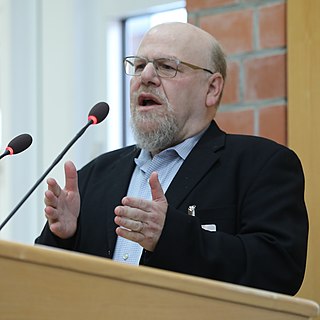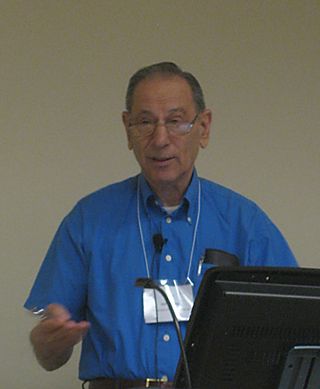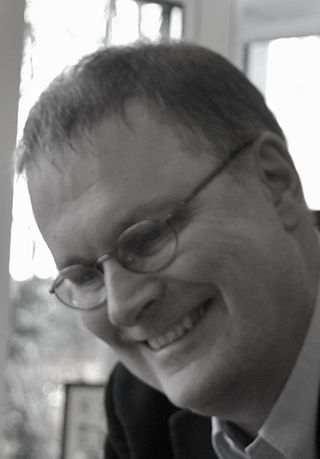Related Research Articles

Professor Sartaj Kumar Sahni is a computer scientist based in the United States, and is one of the pioneers in the field of data structures. He is a distinguished professor in the Department of Computer and Information Science and Engineering at the University of Florida.

J Strother Moore is a computer scientist. He is a co-developer of the Boyer–Moore string-search algorithm, Boyer–Moore majority vote algorithm, and the Boyer–Moore automated theorem prover, Nqthm. He made pioneering contributions to structure sharing including the piece table data structure and early logic programming. An example of the workings of the Boyer–Moore string search algorithm is given in Moore's website. Moore received his Bachelor of Science (BS) in mathematics at Massachusetts Institute of Technology in 1970 and his Doctor of Philosophy (Ph.D.) in computational logic at the University of Edinburgh in Scotland in 1973.
Michael Irwin Jordan is an American scientist, professor at the University of California, Berkeley and researcher in machine learning, statistics, and artificial intelligence.

James Alexander Hendler is an artificial intelligence researcher at Rensselaer Polytechnic Institute, United States, and one of the originators of the Semantic Web. He is a Fellow of the National Academy of Public Administration.

Jack Minker was a leading authority in artificial intelligence, deductive databases, logic programming and non-monotonic reasoning. He was also an internationally recognized leader in the field of human rights of computer scientists. He was an Emeritus Professor in the University of Maryland Department of Computer Science, which is part of the College of Computer, Mathematical, and Natural Sciences.

Moshe Ya'akov Vardi is an Israeli mathematician and computer scientist. He is the Karen Ostrum George Distinguished Service Professor in Computational Engineering at Rice University, United States. and a faculty advisor for the Ken Kennedy Institute. His interests focus on applications of logic to computer science, including database theory, finite model theory, knowledge of multi-agent systems, computer-aided verification and reasoning, and teaching logic across the curriculum. He is an expert in model checking, constraint satisfaction and database theory, common knowledge (logic), and theoretical computer science.

Michael Lederman Littman is a computer scientist, researcher, educator, and author. His research interests focus on reinforcement learning. He is currently a University Professor of Computer Science at Brown University, where he has taught since 2012.

Manuela Maria Veloso is the Head of J.P. Morgan AI Research & Herbert A. Simon University Professor in the School of Computer Science at Carnegie Mellon University, where she was previously Head of the Machine Learning Department. She served as president of Association for the Advancement of Artificial Intelligence (AAAI) until 2014, and the co-founder and a Past President of the RoboCup Federation. She is a fellow of AAAI, Institute of Electrical and Electronics Engineers (IEEE), American Association for the Advancement of Science (AAAS), and Association for Computing Machinery (ACM). She is an international expert in artificial intelligence and robotics.
Donald W. Loveland is a professor emeritus of computer science at Duke University who specializes in artificial intelligence. He is well known for the Davis–Putnam–Logemann–Loveland algorithm.
Lydia E. Kavraki is a Greek-American computer scientist, the Noah Harding Professor of Computer Science, a professor of bioengineering, electrical and computer engineering, and mechanical engineering at Rice University. She is also the director of the Ken Kennedy Institute at Rice University. She is known for her work on robotics/AI and bioinformatics/computational biology and in particular for the probabilistic roadmap method for robot motion planning and biomolecular configuration analysis.

Milind Tambe is an Indian-American educator serving as Professor of Computer Science at Harvard University. He also serves as the director of Center for Research on Computation and Society at Harvard University and the director of "AI for Social Good" at Google Research India.

Lise Getoor is a professor in the computer science department, at the University of California, Santa Cruz, and an adjunct professor in the Computer Science Department at the University of Maryland, College Park. Her primary research interests are in machine learning and reasoning with uncertainty, applied to graphs and structured data. She also works in data integration, social network analysis and visual analytics. She has edited a book on Statistical relational learning that is a main reference in this domain. She has published many highly cited papers in academic journals and conference proceedings. She has also served as action editor for the Machine Learning Journal, JAIR associate editor, and TKDD associate editor.

Qiang Yang is the Chair Professor, Department Head of CSE, HKUST in Hong Kong and University New Bright Professor of Engineering and Chair Professor from 2015. He was the founding head of Noah's Ark Lab. He had taught at the University of Waterloo and Simon Fraser University. His research interests are data mining and artificial intelligence.
Nancy Marie Amato is an American computer scientist noted for her research on the algorithmic foundations of motion planning, computational biology, computational geometry and parallel computing. Amato is the Abel Bliss Professor of Engineering and Head of the Department of Computer Science at the University of Illinois at Urbana-Champaign. Amato is noted for her leadership in broadening participation in computing, and is currently a member of the steering committee of CRA-WP, of which she has been a member of the board since 2000.

Martha Elizabeth Pollack is an American computer scientist who has served as the 14th president of Cornell University since April 2017. Previously, she served as the 14th provost and executive vice president for academic affairs of the University of Michigan from 2013 to 2017.

Shlomo Zilberstein is an Israeli-American computer scientist. He is a Professor of Computer Science and Associate Dean for Research and Engagement in the College of Information and Computer Sciences at the University of Massachusetts, Amherst. He graduated with a B.A. in Computer Science summa cum laude from Technion – Israel Institute of Technology in 1982, and received a Ph.D. in Computer Science from University of California at Berkeley in 1993, advised by Stuart J. Russell. He is known for his contributions to artificial intelligence, anytime algorithms, multi-agent systems, and automated planning and scheduling algorithms, notably within the context of Markov decision processes (MDPs), Partially Observable MDPs (POMDPs), and Decentralized POMDPs (Dec-POMDPs).

Michael John Wooldridge is a professor of computer science at the University of Oxford. His main research interests is in multi-agent systems, and in particular, in the computational theory aspects of rational action in systems composed of multiple self-interested agents. His work is characterised by the use of techniques from computational logic, game theory, and social choice theory.

Carla Pedro Gomes is a Portuguese-American computer scientist and professor at Cornell University. She is the founding Director of the Institute for Computational Sustainability and is noted for her pioneering work in developing computational methods to address challenges in sustainability. She has conducted research in a variety of areas of artificial intelligence and computer science, including constraint reasoning, mathematical optimization, and randomization techniques for exact search methods, algorithm selection, multi-agent systems, and game theory. Her work in computational sustainability includes ecological conservation, rural resource mapping, and pattern recognition for material science.
Carla E. Brodley is a computer scientist specializing in machine learning. Brodley is a Fellow of the ACM, the Association for the Advancement of Artificial Intelligence (AAAI), and the American Association for the Advancement of Science (AAAS). She is the Dean of Inclusive Computing at Northeastern University, where she serves as the Executive Director for the Center for Inclusive Computing and holds a tenured appointment in Khoury College of Computer Sciences. Brodley served as dean of Khoury College from 2014-2021. She is a proponent for greater enrollment of women and under-represented minorities in computer science.
Sheila McIlraith is a Canadian computer scientist specializing in Artificial Intelligence (AI). She is a Professor in the Department of Computer Science, University of Toronto, Canada CIFAR AI Chair, and Associate Director and Research Lead of the Schwartz Reisman Institute for Technology and Society.
References
- ↑ "Publications - Dana Nau". UMD Department of Computer Science. July 22, 2022. Retrieved March 24, 2009.
- ↑ Nau, Dana (1982). "An investigation of the causes of pathology in games". Artificial Intelligence. 19 (3): 257–278. doi:10.1016/0004-3702(82)90002-9.
- ↑ "Simple Hierarchical Ordered Planner".
- ↑ "Automated Planning and Acting".
- ↑ "Elected AAAI Fellows".
- ↑ "2022 AAAS Fellows approved by the AAAS Council". Science. 379 (6634): 768–772. 24 February 2023. Bibcode:2023Sci...379..768.. doi:10.1126/science.adh2210. PMID 36821656. S2CID 240657197.
- ↑ ACM Names Fellows for Computing Advances that Are Transforming Science and Society Archived 2017-09-15 at the Wayback Machine , Association for Computing Machinery, accessed 2013-12-10.